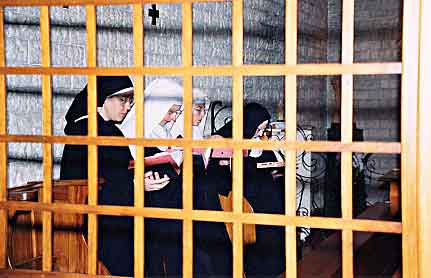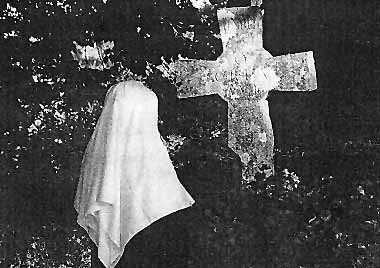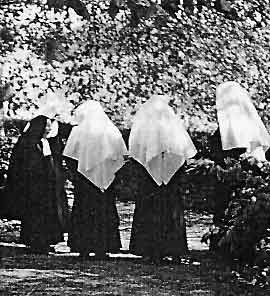

![]()
![]()
|
Religious
Communities for Women BENEDICTINE NUNS MONASTERY OF NOTRE-DAME DE TOUTE CONFIANCE For two thousand years, the Church of Our Lord Jesus Christ has been making its way at the price of ceaseless trials and tribulations. The Apostles, privileged witnesses of the Death and Resurrection of Our Lord, were its foundation stones. The martyrs sprinkled it with their blood. Then the fathers of the Desert defended its purity by separating themselves from the world to pray. Soon they recognized the need of coming together in monasteries. In our times, it is in monasteries still that are to be found “seekers of God”, who have but one love in their hearts: that of Our Lord, whose call they have heard: “Come follow Me; and learn of Me for I am meek and humble of Heart.”
The Divine Office, Heart of the Benedictine Life Inspired by the monks of the Orient, St. Benedict founded the monastic life in Italy in the sixth century. The monastic life soon crossed Italy’s border and spread throughout the world. In a peaceful little valley of Deux Sèvres, at “Notre-Dame de Toute Confiance,” not far from the region of the Vendée, renown for its heroic Catholic resistance during the French Revolution, a small group of Benedictines have assembled, desiring to follow the rule of St. Benedict, and to lead a life of prayer and contemplation. “Seven times a day” and once at night, they assemble in the Chapel to praise God. The Divine Office, truly the prayer of the Church since the first centuries, is chanted in Latin and Gregorian, which requires care and study, so that “the heart be in accord with the voice”, as St. Benedict says. These canonical hours, by the way, are but the repercussion, the echo of the “sacrifice of praise” of Our Lord Jesus Christ; the Holy Mass. The Mass is at the center of the monastic life. Each day, Christ Jesus offers anew the sacrifice of Calvary, and renews His call to a greater love: to give ones’ life, to give one’s self, to let one’s self be seized by Christ. "Idleness is the soul's enemy" (Rule) To belong to the Church, to keep the Mass of all Times, to maintain the monastic traditions: such is the desire of the nuns of Notre Dame de Toute Confiance. They do not seek to innovate, but rather “attach their barque to the ship of the ancients”. The Rule of St. Benedict is organized for “seeking firstly the Kingdom of God”. A great Irish monk, Dom Marmion, who governed the Abbey of Maredsous in Belgium at the beginning of the century, explained it thus: “When one submits himself entirely to Jesus Christ, when one abandons himself to Him, when our soul does but answer, as He did, a perpetual ‘Amen’ to all that he asks of us in His Father’s name, when we remain in this attitude of adoration, then Our Lord Jesus Christ establish His peace in us.” This “peace” sought and pursued unstintingly has become the motto of the Benedictines.
O Crux Ave, Spes Unica! The nun lives for Christ alone; her only desire is Our Lord Jesus Christ lives in her, sing in her, pray, suffer and come to life again in her. She begins to “run in the way of the commandments with an ineffable sweetness of love”, but only having accorded her life, by an oft exercised patience, to the Passion of her dear Lord.
Ora et labora! “To combat under the true King, Jesus Christ, with the powerful and glorious weapon of obedience” also means undertaking everything that is commanded. A vegetable garden and a poultry yard are quite useful in the countryside. Household chores also fill up the hours, but all that is accomplished out of love dispossesses us of our self-will. The virtue of obedience is the dear daughter of humility, and is it not this virtue that pleased the Most High in Our Lady? It is comforting to pray to her under this name of “Toute Confiance”, sure that it is she who governs the community and gives it unity.
Feed my sheep! If the monastic life is a life of prayer and work, it is also an apostolic life. Indeed, how can one keep from making one’s own the intention that Our Lord be formed more and more in souls. Archbishop Lefebvre thought – because he had experienced it – that the “treasures of graces for missionaries are found in the convents of the contemplatives”. “It is by prayer, sacrifice and penance that God gives his graces to the world,” he would say. The life of a Benedictine proceeds thus: after a few months of postulate, the receiving of the habit marks the entry into the novitiate, which lasts two years. The novice then makes temporary vows for three years; and then she pronounces her perpetual vows, with the obligation of staying in the monastery of her profession (vow of stability), and laboring there in obedience and humility so as to live ever more and more for God alone (vow of conversion of life).
"How sweet it is to dwell together!" “Whoever you may be, who hurry to attain everlasting life, with Our Lord’s help, accomplishes this little rule for beginners,” says St. Benedict modestly, “and you will reach the highest summit of perfection.” Rev. Mother
Superior other Benedictine Congregations: Monastery of the Sacred Heart of Jesus Dominican Teaching Sisters of the Holy Name of Jesus and the Immaculate
Heart of Mary The foundation of Post Falls, ID U.S.A.
|




